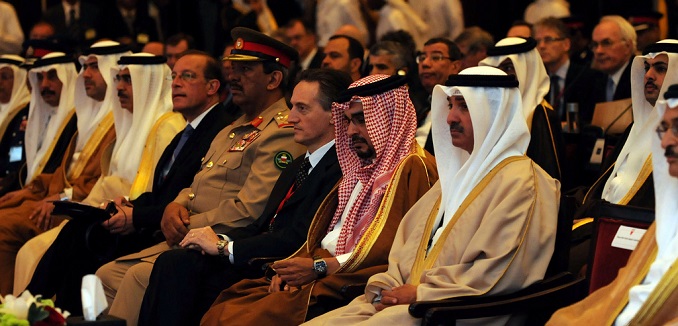Al Arabiya on Wednesday conveyed statements from Kuwait’s foreign minister suggesting that the bulk of the Gulf Cooperation Council (GCC) was close to healing a rift with GCC member Qatar, which had been deepening in recent months and even years as Qatar allied itself with actors that the Gulf countries consider to be regional antagonists:
Sheikh Sabah Khaled al-Hamad al-Sabah, who is also Kuwait’s first deputy prime minister, noted an imminent breakthrough in inter-GCC ties, referring to Kuwaiti mediation efforts between Riyadh, the UAE and Bahrain on the one hand and the Qatar on the other.
Sabah’s comments came during an address to the Board of Trustees of the Kuwait-based Council For Arab and International Relations (CFAAIR) – an independent Arab think tank aimed at providing technical support for Arab decision markers on regional and international issues.
Riyadh and its allies had long ago coalesced, along with Israel, into a de facto bloc of traditional U.S. allies, aligned opposite both a radical Sunni bloc anchored by Turkey and the Muslim Brotherhood and the Shiite camp of Iran and its allies. Qatar had broadly acted to support radical Sunni elements, and – despite substantial criticism from its Arab neighbors – had prominently assisted the Egyptian Muslim Brotherhood.
The geopolitical gambles failed to pay off, and Qatar’s foreign influence crashed as Turkey suffered its own decline and the Egyptian Muslim Brotherhood was overthrown by the country’s Saudi-backed army. Egypt functionally broke off diplomatic ties with Qatar, and in March, Saudi Arabia, the UAE, and Bahrain followed suit by recalling their ambassadors. The Arab states insist that Doha has violated a GCC pact not to support “anyone threatening the security and stability of the GCC whether as groups or individuals – via direct security work or through political influence, and not to support hostile media,” a gesture to Qatar’s general support for the pro-Brotherhood coverage broadcast by the Qatari-based Al Jazeera station.
Bringing Qatar back into the GCC fold would be treated as a boost to the Arab bloc, and as a blow to Turkish foreign policy and to the Brotherhood’s regional prospects. The moves may have domestic implications, as the Obama administration has faced pointed criticism for inadequately supporting traditional U.S. allies against geopolitical and internal adversaries.
[Photo: Zamanalsamt / Flickr]




